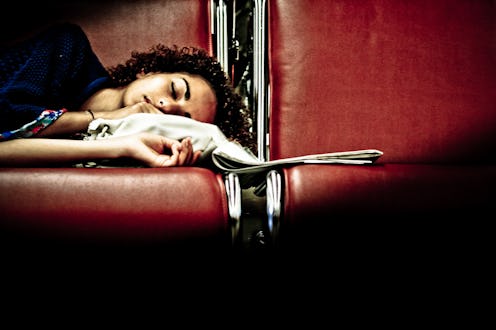
We've all been there: You're trying to fall asleep, tossing and turning, distracted by the millions of thoughts that chose now to rush through your head, and no matter how hard you try, you just can't drift off. But according to science, the key to falling asleep may be to stop trying. A study done in 2003 and recently highlighted by Richard Wiseman, a University of Hertfortshire psychologist, essentially instructed one group of insomniacs to try and sleep as they normally did and another group to try to stay awake at all costs. The group ordered to stay awake were limited to their beds, and all they could really do while trying to say awake was lie still, breathe, and blink. Guess what happened?
Surprisingly, the group that tried to stay awake fell asleep significantly more quickly than the group that tried to fall asleep as they usually do — which shows us that perhaps one way to get better sleep is not to focus on it. You don't necessarily have to lie still and focus on your breathing, but ridding yourself of distractions like your smart phone and computer is certainly important because all the stimulus on the interact can actually counteract this effect (although I will say reading a book before bed always helps me peacefully drift off, but that's probably because my body isn't jumping between a million different images).
Since the experiment was done on 34 people over a 14-week period, the sample size to verify this information is a little bit limited; as such, it's possible that while this specific conclusion worked for this specific set of data, other people won't necessarily have so much luck falling asleep by not trying to fall asleep. Luckily, since sleep is such an integral part of the human experience, there are a lot of tips and tricks various people have found to help you fall asleep and increase the quality of your sleep. For example, the duo at AsapSCIENCE and AsapTHOUGHT recommend napping more, cutting down on alcohol, cigarettes, and caffeine, having a schedule because your body loves routine, and quitting staring at your screens (among other things) to help you sleep at night.
The folks over at watchwellcast take it a step further and explain how sleep is tied closely to our physical and mental health. While they offer some of the same tips for falling asleep as the last video, they add some new ones like "stop staring at the clock" because, honestly, nothing is more distressing than watching the hours of sleep you'll get that night dwindling away before your tired eyes.
According to SciShow, over 60 million people suffer from insomnia. Indeed, one of the most Googled questions in the English speaking world is "how can I fall asleep." The team at SciShow dissect some important factors in helping you fall asleep, like hormones, light, and various hypnotics.
If you're having trouble falling asleep, these short videos provide a lot of diverse tips and options, but if it's causing you too many problems, don't shy away from a quick trip to the doctor! Sleep helps our bodies function properly and without it we wouldn't survive for too long, so take care of your bodies and drift off into dreamland.
Image: Brice Cannone/Flickr